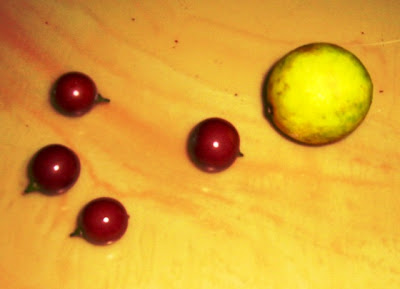
“Don’t eat that fruit,” was the warning. Now, this has nothing to do with the Garden of Eden or Adam and Eve or apple. It was a caution to me and my siblings when we were children. We in turn say the same to our children and grand children.

(Size comparison with a lime.)
The reason for the warning? “It will make your intestines stick together,” the elders would say. And the reason for that? The tiny fruit contains glue inside. Remove the stalk and squeeze gently, and presto, the sticky liquid flows out evenly.
One could call the fruit a glue capsule that grows on a tree. Before the days of roll on or brush on gum, this was used to stick envelopes. The thorns on the tree can effectively pin papers together. Therefore the plant could be called ‘two-in-one’ office equipment.
The one we have at Olavipe is a hardy shrub about 10-12 feet high. It looks the same today as it did in my childhood. Almost certainly it was planted by my grandfather. That would make the tree about 100 years old. And it still bears fruits as you can see from the photographs.

What is the name of this tree which I have not seen anywhere else? I spent a great deal of time on the Internet to identify the plant but no success. Locally it is called pasa (glue) narakam (citrus tree). The leaves look like that of citrus, but do not have the same smell.
Normally as a tree grows older, its seeds scatter far and wide. But this is the only plant of its type in our area. Probably the reason is that the birds dislike the glue taste and do not carry them away. Some of the fruits that fall to the ground do germinate but cannot survive in the heavy shade. Now our chief gardener Bhaskaran has saved three saplings which he has planted at different locations.
If you have any information on this tree will you kindly share it with us by way of a comment. Or you can email me at abrahamtharakan1@gmail.com
No paradise would be lost if one eats the fruit. I have, like other children, tasted it. Yucky! (Learned that expression from my little granddaughter – first time I got a chance to use it.)
Ends.
Photos by me. Copyright reserved. Click on them for enlarged view.
Also see: Ixora coccinea (Rubiaceae) - flowers that gods and men love
No comments:
Post a Comment